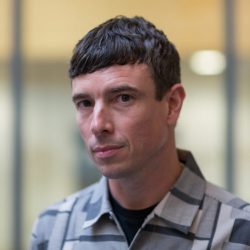
Nick Dunn is Professor of Urban Design and Executive Director of Imagination, the design and architecture research lab at Lancaster University, UK. He is the founding Director of the Dark Design Lab, exploring the impacts of nocturnal activity on humans and non-humans. Nick has worked with the Alliance for Healthy Cites, Design Council European Commission, International Dark-Sky Association, and World Health Organisation. He has authored numerous books, curated exhibitions, and given talks at public festivals and conferences around the world.

Professor Edward Simpson is the Executive Dean of the Faculty of Arts and Social Sciences at Lancaster University. He was previously head of College at SOAS University of London and has held positions at Goldsmiths College and London School of Economics. He is an anthropologist with a long standing interest in South Asia and more recently in infrastructure and environmental questions in the north west of England.
Ed is also a strong advocate of humanities and social sciences in public life.

Mark Davies is the Chief Executive of Lancaster City Council. Mark previously worked at Bolton Council, where he started his career in the public sector as a building cleaner, eventually becoming lead for the service. He took up the role heading the team at Lancaster responsible for services such as cleansing, grounds maintenance, refuse and recycling and ten years later, in March 2022, Mark was appointed as the Chief Executive.
Mark is always focused on delivering better outcomes and believes that the best way of addressing the priorities that our important to our communities is by developing meaningful partnerships and working across systems.
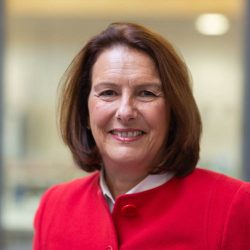
Rachel Cooper OBE is Distinguished Professor of Design Management and Policy at Lancaster University, UK. Her research has focused on the future of cities and human and planetary wellbeing. She was a Lead Expert for the UK Government Foresight programme on the Future of Cities, was on the UK Academy of Medical Sciences Working group addressing ‘The Health of the Public 2040’.
Sustainable Futures panellists
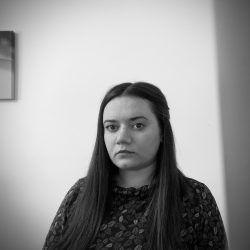
Violet Owen is a Senior Research Associate for the EPSRC Fixing the Future: The Right-to-Repair and Equal IoT project. She is currently investigating how Research through Design (RtD), Participatory and Speculative Design approaches can help to educate the public and raise awareness about the barriers and opportunities for IoT repair. Her research interests include Participatory Design, Speculative Design, Design Fiction, Circular Economy and More-Than-Human perspectives. Violet is also a Postgraduate Researcher at ImaginationLancaster. Her doctoral research focuses on Creative Evaluation approaches, and how these can be used to establish the social impact of Social Innovations.
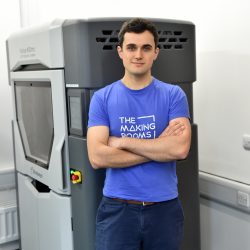
Tom MacPherson-Pope runs The Making Rooms, a community makerspace and innovation hub in the heart of Blackburn. With a background in educational electronics, Tom helped to develop the Micro:Bit, CodeBug and PiFace platforms. Having discovered the maker movement through Fab Lab Manchester as a volunteer, Tom has now visited over 40 hubs, learning from each and bringing this back to his hub.
The Making Rooms recently hosted 15 hub leaders from 11 countries in Blackburn for a week of exchange. The team’s focus for the last few years has been researching community sustainability education, through repair, plastic recycling and biomaterials.

Dr Ana Rute Costa, Lancaster University, is an academic, chartered architect and certified Passivhaus Designer, fostering the creation of dynamic links and knowledge exchange between academia and industry. Her research focuses on accelerating material reuse in construction through materials passports, reducing whole life carbon and enabling a circular economy.
Connect with Ana on LinkedIn www.linkedin.com/in/ana-rute-costa-2a509446

Georgia Whitehouse is Group ESG Analyst at Bluefield Partners LLP, an investment advisory firm for a UK-listed renewable energy infrastructure fund focused on investment into solar, wind and supporting technologies, including battery storage. Her work centres around several sustainability-related themes including climate mitigation & adaptation, sustainable finance, nature & environmental protection, circular economy, and community engagement.
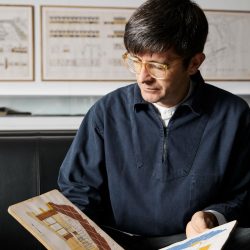
Professor Richard Brook is Director of Research for the School of Architecture at Lancaster University. His own work predominantly concerns British mainstream modernist architecture of the post-war period with a specific focus on the powers of the state and its influence on the built environment. He is a member of the Casework Committee of the Twentieth Century Society, an advisor to the Modernist Society and a judge for the Colvin Prize, awarded by the Society of Architectural Historians of Great Britain for works of reference.
Future Environments panellists
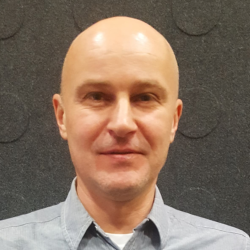
Rupert Griffiths is a cities and urban design research associate in ImaginationLancaster at Lancaster University. He is a cultural geographer, artist, and designer with a background in architecture and urbanism and microelectronic systems engineering.
His research and practice are concerned with the cultural imaginaries of urban nature, particularly those of artists and designers whose work can be seen to challenge or problematise binary views of nature and society. As well as considering the work of artists and designers, he develops fieldwork methods that draw from creative practice.
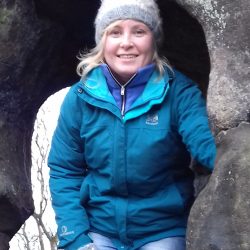
Lorayne Wall is the Planning Officer for Friends of the Lake District (FLD), an independent landscape charity that also represents CPRE – The Countryside Charity in Cumbria. Her work includes responding to planning applications and local and national planning consultations as well as working with communities to help them navigate the planning system. Lorayne joined FLD in 2018 after almost 13 years in local planning policy at South Lakeland District Council, where her final task was as lead on the production of the first dedicated development plan document for an Area of Outstanding Natural Beauty – Arnside & Silverdale.
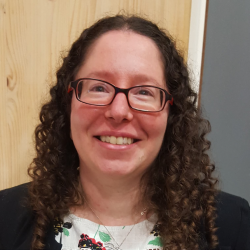
Naomi Jacobs is Lecturer in Design Policy and Futures Thinking at Lancaster University, researching technology and society, and the nature of digital public spaces. Naomi’s work focuses primarily on interaction; between individuals, communities, disciplines or sectors, and between people and technology and the media they consume. Much of her current research is related to how design research can be used in policymaking, particularly in the context of ensuring new technologies and digital platforms and services are ethical, transparent, trustworthy and respect privacy. This work often uses speculative methods such as design fiction to think about what possible futures might look like.
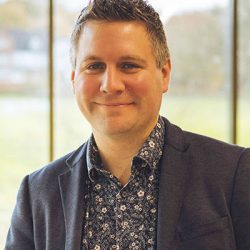
Jez Bebbington is the Partnership Development Manager (NHS) for the Health Partnerships Teams at Lancaster University. His background is in local government, with significant experience of partnership projects and commissioning alongside health and care, VCFSE and other stakeholders. He has an Executive MBA from Lancaster University Management School, and is an active researcher in creating public value through co-design: enabling place-based collaboration around shared opportunities, challenges, resources and solutions. During his time working with local government, Jez led on a local UK Shared Prosperity Fund (UKSPF) programme along with a wide variety of other projects across different sectors.
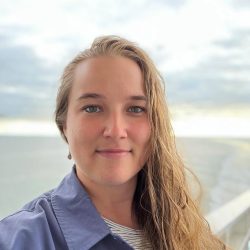
Susanna Dart is the Climate Change Policy Officer at Lancaster City Council in the Planning & Climate Change Service. Her work covers the policies, projects, and priorities of the council in addressing the climate emergency at both a corporate and district level in meeting net zero by 2030. Susanna’s work is particularly focused on planning policy and holistically integrating climate mitigation, adaptation, and resilience.
Digital Futures panellists

Dr Joseph Lindley is a Senior Research Fellow at ImaginationLancaster. He leads Design Research Works, a project that captures and communicates the value of design-led approaches to understanding the impact of emerging technologies such as Artificial Intelligence. designresearch.works
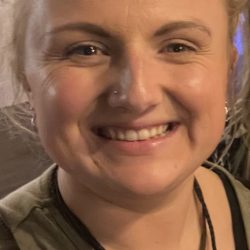
Rhiannon Sharkey has been a primary school teacher for 8 years and currently teaches a year 4 class.
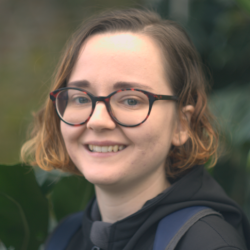
Dr Kim Snooks is a postdoctoral researcher in Design for Digital Good as part of the Digital Good Network. She works with Dr Dan Richards on research around ‘good’ future digital identities, drawing on concepts of the self and identity from personal informatics and social media research. Kim studied for her PhD in Design at ImaginationLancaster, Lancaster University. Her thesis used speculative methods to critically examine future health-tracking technologies. Drawing on more-than human theory, she explored how different perspectives of contextualised personal informatics data might be included in system design.

Rhianne Jones’ work focuses on ensuring emerging technology, and uses of data, support public service media values and a healthy media and information ecosystem. As a UKRI Future Leaders Fellow, Rhianne is establishing and leading a new research centre focused on building desirable and resilient public media futures. Rhianne currently leads the BBC’s engagement with the AHRC BRAID programme, the ESRC Digital Good Network and the EPSRC Centre for Digital Citizens, with which her new centre will connect. She also holds strategic advisory roles for the UK TAS Hub and Horizon Digital Economy Research Institute.
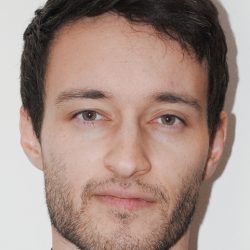
Dr Dan Richards is a designer, creative technologist and lecturer in Data Prototyping and Visualisation at Imagination. His research interests involve combining design and computing to explore futures of digital technologies. He has been a co-investigator on various EPSRC-funded projects including the £1.8M “Chatty Factories” and £500K “Qualified Selves”, and is currently the technology translations lead on the £4M ESRC-funded “Digital Good Network”, which aims to build an interdisciplinary research community focused on what a “good” digital society should look like and how we might get there.
